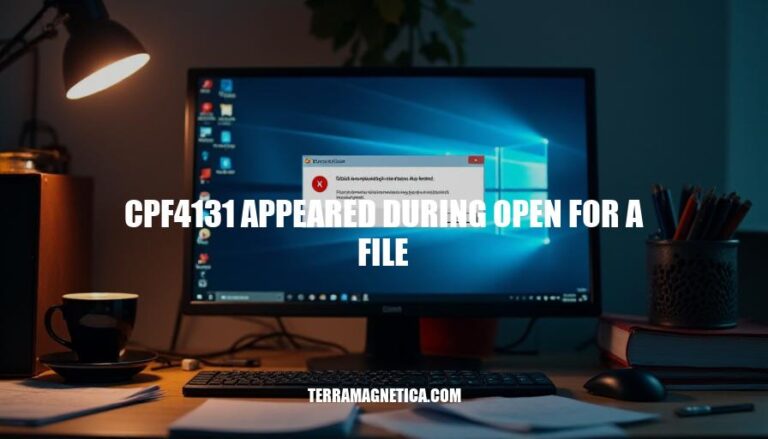


The CPF4131 error message occurs during the opening of a file operation on IBM i systems. This error, known as a level check error, typically arises when a file has been changed and recompiled without recompiling the programs that use it. Understanding CPF4131 is crucial for effective troubleshooting and maintaining system integrity, as it helps identify and resolve compatibility issues between files and programs.
The CPF4131 error occurs during a file open operation due to a level check failure. Here are the primary reasons:
File Version Mismatches: This happens when a program is compiled with a specific version of a file, but at runtime, it encounters a different version. The system checks the record format level identifier, and if it doesn’t match, the CPF4131 error is triggered.
Changes in File Structure: If the structure of a file (e.g., field length, data type, number of fields) is altered without recompiling the dependent programs, the level identifiers will differ, causing the error. This includes adding new fields, changing field types, or modifying field lengths.
LVLCHK Parameter: The level check parameter (LVLCHK) can be set to *NO to bypass this check, but this is generally not recommended as it can lead to data integrity issues.
Recompilation Issues: Programs that use the file must be recompiled whenever the file structure changes. Failing to do so will result in the CPF4131 error when the program tries to open the file.
Common scenarios include:
These changes necessitate recompiling all dependent programs to ensure the level identifiers match.
Encountering the CPF4131 error during a file open operation can have significant consequences:
Program Execution Disruption: The CPF4131 error, which indicates a level check failure, occurs when the file structure has changed (e.g., new fields added) but the program using the file hasn’t been recompiled. This mismatch stops the program, causing an abrupt halt in execution.
Data Integrity Issues: If the file changes involve modifications to field lengths or types, using the file without recompiling the program can lead to incorrect data processing. This can corrupt data, produce erroneous outputs, and compromise the integrity of the database.
To mitigate these issues, it’s crucial to recompile programs whenever the associated files are altered.
Identify the Cause:
Recompile Programs:
Use File Overrides:
OVRDBF command to override the file level check for specific programs if recompiling is not feasible.Check File Level Checks:
LVLCHK parameter of the file. Use CHGPF or CHGPRTF commands to set LVLCHK(*NO) if appropriate, but be cautious as this can lead to data integrity issues.Restore Programs:
: IBM Support
: Midrange.com
: IBM Support
To prevent the CPF4131 error during file operations, consider these best practices:
Maintain File Consistency:
Regular Recompilation of Programs:
Careful Management of File Changes:
LVLCHK(*YES) parameter to enforce level checking, ensuring that programs fail fast if they encounter unexpected file formats.OVRDBF command to override the file level check for specific programs, but use this cautiously to avoid data integrity issues.Implementing these practices can help maintain stability and prevent the CPF4131 error from disrupting your operations.
The CPF4131 error occurs when a program encounters a different version of a file than it was compiled with, causing a level check failure during file open operations.
This can happen due to changes in file structure, recompilation issues, or the LVLCHK parameter being set to *NO.
To prevent disruptions, maintain file consistency by:
Thorough troubleshooting involves identifying the cause, recompiling programs, using file overrides if necessary, checking file level checks, restoring programs if needed, and implementing best practices such as: